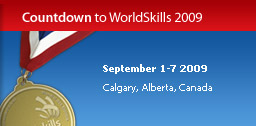History of WorldSkills International
Spain is considered the founder of the organization responsible for WorldSkills International.
In 1946 there was a great need for skilled workers in Spain. Mr. José Antonio Elola Olaso, who was General Director of OJE (Spanish Youth Organization), had an inspiration: to convince youngsters, as well as their parents, teachers and prospective employers that their future depended on an effective vocational training system.
He believed a competition would arouse enthusiasm among the youth, adults and spectators alike. State agencies, enterprises and religious vocational training schools were all interested.
This simple yet brilliant idea of watching people from different trades compete proved to be a great success.
- 1947: Approximately 4,000 Spanish apprentices from a dozen mechanical trades compete at the first National Competition in Spain.
- 1950: Portugal accepts an invitation to join the first Iberian Competition. International observers are invited and seduced by the idea.
- 1953: Youngsters from Germany, Great Britain, France, Morocco and Switzerland take part for the first time.
- 1954: The first Organizing Council is established to set the rules for International Competitions. German and Swiss participation leads to the introduction of the dual system, a traditional vocational training model in both nations.
- 1958: The 7th International Vocational Training Competition (IVTC) is held as part of the Brussels World Exhibition.
- 1959: The competition moves to Modena, Italy.
- 1970: The event travels the globe to Japan. With the admission of member countries/regions from all continents, the International Vocational Training Organization (IVTO) gains experience, increases its knowledge of vocational training and applies new working techniques and methods in several trades.
- 2000: The IVTO changes its name to WorldSkills International.
Today, being selected to compete in a WorldSkills Competition is a source of great pride and honour. In spite of language barriers, the experience has a lasting personal and professional impact on all participants. The competitions not only rank Member countries/regions and award medals. The underlying goal is to enhance and promote vocational training systems worldwide.


